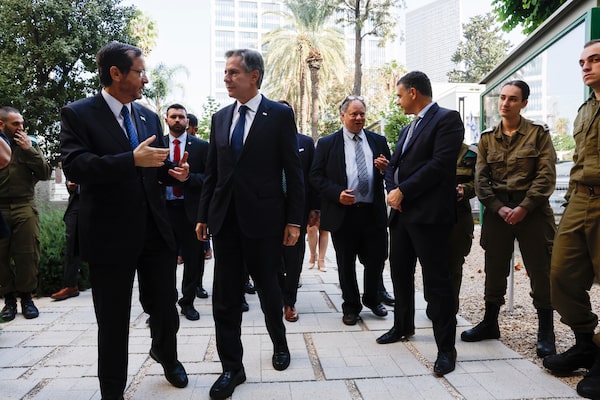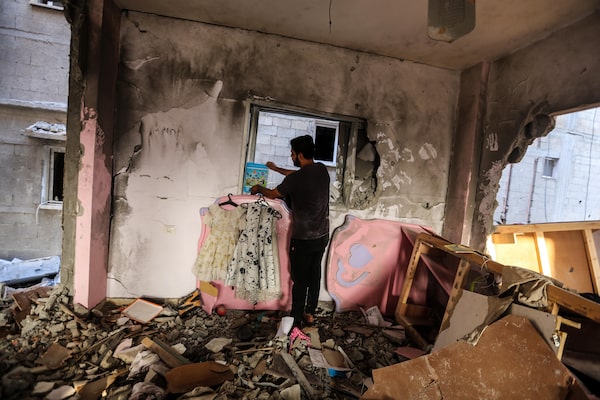
U.S. Secretary of State Antony Blinken, center, listens to Israeli President Isaac Herzog, left, in Tel Aviv, Israel, on Nov. 3.Jonathan Ernst/The Associated Press
Israeli Prime Minister Benjamin Netanyahu on Friday pushed back against growing U.S. pressure for a “humanitarian pause” in the nearly month-old war to protect civilians and allow more aid into Gaza, insisting there would be no temporary ceasefire until the roughly 240 hostages held by Hamas are released.
U.S. Secretary of State Antony Blinken made his third trip to Israel since the war began, reiterating American support for Israel’s campaign to crush Hamas after its brutal Oct. 7 attack in southern Israel. He also echoed President Joe Biden’s calls for a brief halt in the fighting to address a worsening humanitarian crisis.
Alarm has grown over spiralling Palestinian deaths and deepening misery for civilians from weeks of Israeli bombardment and a widening ground assault that risks even greater casualties. Overwhelmed hospitals say they are nearing collapse, with medicine and fuel running low under the Israeli siege. About 1.5 million people in Gaza, or 70 per cent of the population, have fled their homes, the UN said Friday.
After talks with Mr. Netanyahu, Mr. Blinken said a temporary halt was needed to boost aid deliveries and help win the release of the hostages Hamas took during its brutal Oct. 7 incursion.
But Mr. Netanyahu said he told Mr. Blinken that Israel was “going with full steam ahead,” unless hostages are released.
U.S. officials say they are not seeking a ceasefire but short pauses in specific areas to allow aid deliveries or other humanitarian activity, after which Israeli operations would resume. Mr. Netanyahu has not publicly addressed the idea and has instead repeatedly ruled out a ceasefire.
Israel strikes ambulance in Gaza City, many reported killed
In Gaza, Israeli troops tightened their encirclement of the largest city amid continued battles with Hamas militants.
Strikes hit by the entrances of three hospitals in northern Gaza just as staff were trying to evacuate wounded to the south, hospital directors said. Footage showed the aftermath outside Gaza’s largest hospital, Shifa, where more than a dozen bloodied bodies of men, women and young children were strewn next to damaged cars and ambulances. One bleeding boy screamed as he huddled on top of a woman sprawled on the pavement.
At least 10 people were killed outside Shifa Hospital, its director, Mohammed Abu Salimia, told Al Jazeera TV. At least 50 others were killed or wounded in a strike outside the Indonesian Hospital, its director said.
What would a ceasefire or ‘humanitarian pause’ mean in the Israel-Hamas war?
Throughout the war, Israel and Hezbollah have traded fire almost daily along the Lebanon border, raising fears of a new front opening there.
In his first public speech since the war began, Hezbollah leader Hassan Nasrallah said the cross-border fighting showed his group had “entered the battle.”
He suggested escalation was possible: “We will not be limited to this.” But he stopped short of announcing that Hezbollah would fully engage in the fighting. So far, Hezbollah has taken calculated steps to show backing for Hamas without igniting an all-out war that would be devastating for Lebanon and Israel.
Mr. Blinken said the U.S., which has deployed aircraft carriers and other forces in the eastern Mediterranean, was committed to ensuring that no “second or third front” opens.
Mr. Nasrallah dismissed U.S. warnings: “Your fleets in the Mediterranean ... will not scare us.”
Thursday saw one of the heaviest exchanges over the border yet. Hezbollah attacked Israeli military positions in northern Israel with drones, mortar fire and suicide drones, and Israeli warplanes and helicopter gunships retaliated with strikes in Lebanon. Israeli military spokesman Rear Admiral Daniel Hagari said civilians were wounded in the Hezbollah attacks.

A man salvages his belongings in a building destroyed during Israeli air raids in Khan Yunis.Ahmad Hasaballah/Getty Images
“We are in a high state of readiness in the north, in a very high state of alert, to respond to any event today and in coming days,” he said.
The exchanges since the start of the war have killed 10 Lebanese civilians and 66 fighters from Hezbollah and other militant groups and seven Israeli soldiers and a civilian in northern Israel.
Hezbollah is much stronger than Hamas, with an arsenal of some 150,000 rockets and missiles, some believed to be precision-guided weapons capable of striking deep inside Israel.
Israel has promised to unleash vast destruction in Lebanon if all-out war erupts, accusing Hezbollah of hiding its military installation in the midst of residential areas. The two enemies fought an inconclusive month-long war in 2006.
More than 9,200 Palestinians have been killed in Gaza so far, two-thirds of them women and minors, the Gaza Health Ministry said, without providing a breakdown between civilians and fighters.
More than 1,400 people have died on the Israeli side, mainly civilians killed during Hamas’ initial attack. Rocket fire by Gaza militants into Israel has continued, disrupting life for millions of people and forcing an estimated 250,000 people to evacuate towns in northern and southern Israel. Most rockets are intercepted.
Twenty-four Israeli soldiers have been killed in Gaza since the start of the ground operation.
French Institute in Gaza, AFP office hit by Israeli air strike
The toll is likely to rise dramatically. Israeli military officials said their forces have encircled densely built-up Gaza City and began Friday to launch targeted attacks within the city on militant cells.
Hundreds of thousands of Palestinians remain in the city and nearby parts of northern Gaza. Israel says Hamas has extensive military infrastructure in the city, including a network of underground tunnels, bunkers and command centres. It says its strikes target Hamas and the militants endanger civilians by operating among them.
Friday’s strike outside Shifa Hospital came after Israel said Hamas has a command centre at the facility – a claim that could not be independently verified and that Hamas and hospital officials deny.
The Israeli military said its aircraft Friday hit an ambulance near a battle zone that Hamas fighters were using to carry weapons. That claim could not be verified either.
The Palestinian Red Crescent said a strike damaged one of its ambulances carrying wounded to southern Gaza on the coastal highway. The agency posted images of the vehicle with its hood destroyed and blood on the side.
The military said its troops have killed numerous Hamas militants exiting tunnels. Footage released by the military showed soldiers and tanks advancing toward bombed-out buildings.
Israel has repeatedly told residents of Gaza’s north to evacuate to the south for greater safety. But many have been unable to leave or stay fearing continued air strikes in the south.
The military on Thursday told residents to evacuate the Shati refugee camp on Gaza City’s edge. On Friday, shells hit a convoy of evacuees on the coastal road they were told to use, killing around a dozen people, doctors said. Footage from the road showed dead children lying in the sand.
Further south, workers pulled 17 bodies from the rubble of a building levelled by a strike in Khan Younis, witnesses said. AP images showed rescuers digging with bare hands to save someone completely buried, with one arm protruding from the wreckage. At a hospital, a crying man held up the dead body of a small girl whose lower limbs appeared to be missing.
In the occupied West Bank overnight, Israeli forces killed seven Palestinians in different places and arrested many more, according to the Israeli military and Palestinian health officials.
Mr. Blinken first held talks with Mr. Netanyahu before holding wider discussions with the Prime Minister’s war Cabinet and meeting with President Isaac Herzog. He stopped later Friday in Amman, Jordan.
As American officials have before, Mr. Blinken pledged unwavering support for Israel, saying it " has not only the right but the obligation to defend itself.”
Mr. Biden’s suggestion for a humanitarian “pause” in the fighting aims to let in aid for Palestinians and let out more Palestinians who hold foreign passports and wounded.
More than 386 Palestinian dual nationals and wounded exited Gaza into Egypt on Friday, according to Wael Abou Omar, the Hamas spokesman for the Rafah border crossing. That brings the total who have gotten out since Wednesday to 1,115.
Israel has allowed more than 300 trucks carrying food and medicine into Gaza, but aid workers say it’s not nearly enough. Israeli authorities have refused to allow fuel in, saying Hamas is hoarding fuel for military use and would steal new supplies.